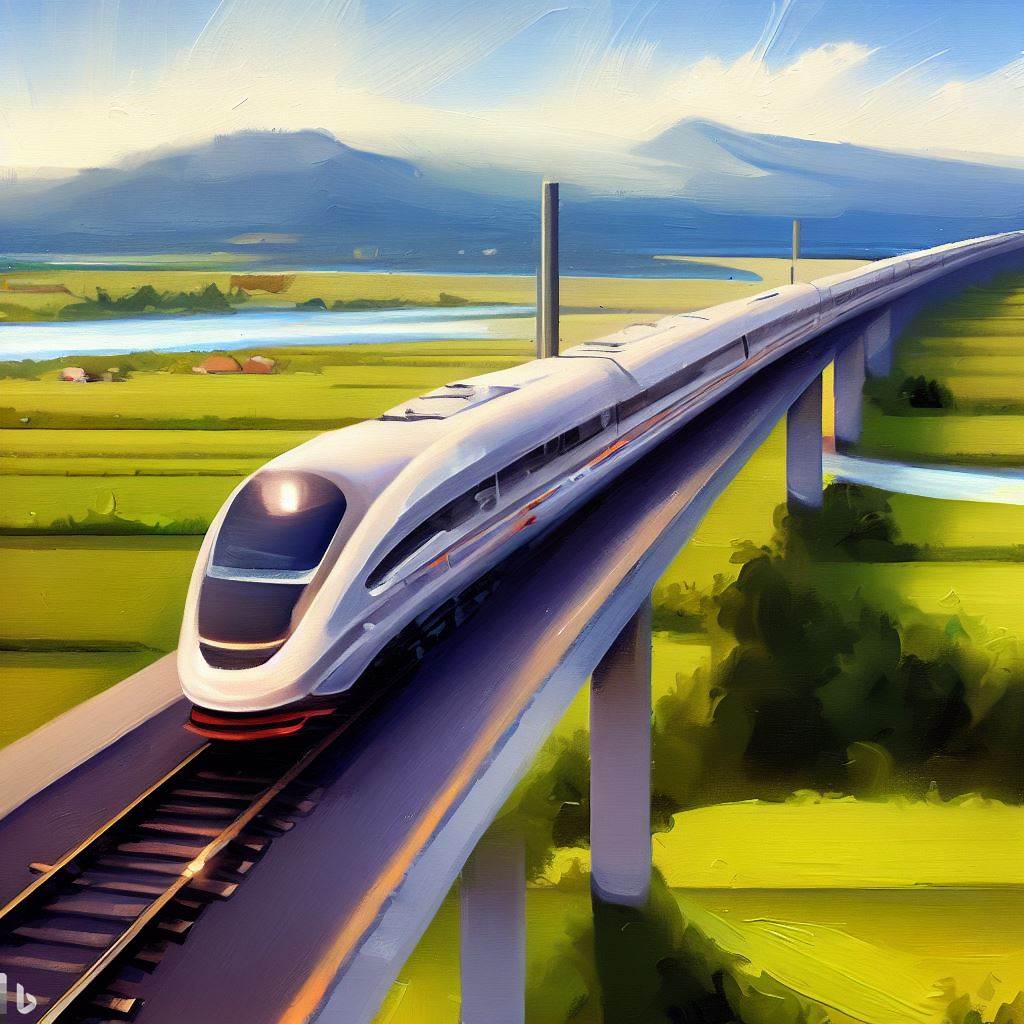Trams, trains, bikes. The Holy Trinity of sustainable transport that must be pursued instead of EVs for an actually livable planet.
Death to the car. Death to America.
yeah and tyre abbrasion correlates with weight, which given the current trend of "Same car but now EV = lots heavier" that one's just gonna get worse, same for brakes. Pretty much just trading exhaust particles for more particulate dust from tyres and brakes
also, if the West did adopt EVs en mass (hard to even imagine), all those ICE vehicles aren't just disappearing. They're getting exported to the rest of the world as cheap used cars. Nothing has been "replaced", you've just made more cars and more pollution.
Let's spend the EV money on a time machine and drop a comically large anvil on Henry Ford
@TheLastHero @Masimatutu Nah, there's not much intercontinental transport of used cars. Too expensive and complicated. If the West adopted EVs en mass there would be a lot less gasoline consumption there, and little increase elsewhere.
I disagree. The UN predicts the number of light duty vehicles to more than double by 2050, with 90% of that growth happening in non-OECD countries. Granted that would be a mix of new and used cars, but the vehicle trade is only regulated on the national level. That means there are considerable financial incentives to export abroad and take advantage of regulatory inconsistency.
For example, stricter emissions laws means that many cars may not be able to be driven at all in a country, but those laws do not exist elsewhere- that will cause an oversupply of cars that can't be legally sold domestically, but demand for cars is only grow in the global south as their economies and standards of living improve. Logistic and shipping costs also get cheaper every year and shouldn't be relied on as a economic deterrent, and it's apparently already cheap enough for the US, Japan, and EU to export 14 million used vehicles between 2015-2018. Rich counties and their populations tend to replace their cars far before their economic life is over as well, and vehicle values depreciate far quicker in the OECD compared to elsewhere. There's going to be a lot of economic pressure to export more cars in the near future, especially if the OCED countries try to get "serious" about ICE vehicles without including the rest of the world in a global agreement.
I just wanna say I appreciate people here making intelligent, good faith arguments on both sides without resorting to black or white thinking or getting too aggressive/ abusive.
turns out just throwing a fuck ton of salt into the environment has negative effects
It also destroys the very infrastructure that it's trying to clear snow from. We eventually need to recognize that rubber wheels on asphalt simply isn't a very efficient or durable method of moving large amounts of stuff long distances. Steel on steel is superior in both efficiency and longevity.
Road-rail vehicles are totally a thing! Mostly for doing inspection and maintenance on rail corridors.
Show
The reverse is also a thing, btw. Though it still uses special rail. But some Russian evil geniuses have made a road drive-able train before, and nobody even knows what for.
Yes, but private trains is not a scalable thing. Putting these on everything solves no problems
Which is why the real solution is PUBLIC transit, not private motor vehicle ownership of any kind beyond small electric personal mobility like an e-bike or scooter.
Of course. An actual train is better than some hybrid boondoggle like a bus train hybrid
We eventually need to recognize that rubber wheels on asphalt simply isn't a very efficient or durable method of moving large amounts of stuff long distances.
I disagree here, there's in here for cars that's hard to do otherwise. I think the problem is more that that is also not at all what cars are primarily used for. Like even in the US 60% of trips are under 6 miles and average occupancy rate is 1,5 persons. That's a bike ride.
I live in a city with about 2 million people. It has major sprawl and lots of guys with big trucks to compensate for little personality. The city has a brown haze floating over it that is a result of tailpipe emissions.
EVs may not be the solution to climate change, but they are helping my local area with air pollution. Well... they would if they were more popular. Every time a local buys an EV, ten more prosthetic penises are sold.
EVs also help with the brake disc "dust" since a lot of the braking is "regenerative breaking" done by the electric motor and does not use the brake pads at all. They require less maintenance, and have fewer parts in them, so fewer manufacturing materials. With very few exceptions, they are also smaller vehicles with more safety features which should result in fewer pedestrian casualties.
Obviously having no vehicles at all would be even better at solving these issues, but that's not practical for our current reality. Maybe in 100 years.
I will say that "autopilot" features should absolutely be outlawed and cause nothing but trouble to everyone.
Brake dust is bad but tire dust is the real issue
Emissions Analytics has found that adding 1,000 pounds to a midsize vehicle increased tire wear by about 20 percent, and also that Tesla’s Model Y generated 26 percent more tire pollution than a similar Kia hybrid. EVs’ more aggressive torque, which translates into faster acceleration, is another factor that creates more tire particulate mile for mile compared to similar internal combustion engine cars.
Which market is it that is producing smaller EVs? They're all just regular cars turned EV, which means they're heavier and you can't feature-rich your way out of physics as per pedestrian safety
No dude, the point is that half-measures and baby steps aren't enough. Our planet is quickly becoming uninhabitable for us. We need radical change.
We will get air purifying headphones with a hardware subscription instead.
The point is that electric cars are shit, have never been a solution to anything, and that they shouldn't be presented as one, doubly so when as a technology, public transport exists.
We will get public transportation from one million people city to the next in billionaire tubes. And exploited drive-app drivers will drive people around inside them, because public transportation isn't flashy or profitable enough without the vacuum and the time savings.
Don't let perfect be the enemy of good

P.S. electric cars are here to save Cars, not the environment
Tail-pipe emissions are not a problem anymore, thanks to obd2, cats, efi and egr
Cats reduce pollutants that contribute to smog that directly harm human health. But they do nothing to reduce the net carbon released into the atmosphere. In fact, by converting carbon monoxide to carbon dioxide they are hastening climate change (CO2 is a more potent greenhouse gas than CO).
I'm pretty sure even Horses beat cars by a mile on enviromental standards. They're needless though, we have invented the bicycle
Funny thing about horses - apparently when cities moved over to cars from horses they became safer. Because horses spook: and one spooked horse can spook the rest and you get a stampede.
Personally I'd rather be riding my horse from village to village over the hills - and I'm lucky enough to have had need to do that in real life. And I would prefer a city of bicycles to a city of cars. But my point (albeit meant casually) is that most of our solutions have downsides too, even the better-looking ones.
Funny thing about horses - apparently when cities moved over to cars from horses they became safer. Because horses spook: and one spooked horse can spook the rest and you get a stampede.
You seem cool enough / not carbrained that I'd like to suggest you to take a closer look at this. The perception of "horse -> car" as per transportation is pretty prevalent but it doesn't really hold up in the sense this fun fact is often touted, it's born out of a car based status quo applied backwards to horses mostly.
I'm happy to merit your insufficient-car-brains certification :-)
What quite do you mean? That horses weren't used in the same way or for the same demographic as cars are now? Sure, and you also don't refill them every 200 miles from the nearest highway hay-station. (Well, kind of...) But there were still horses clustered in many cities for a lot of the time, right? Where now there are cars? And as transport such as did use the one mainly transitioned to the other. I don't suppose there's hard, quantitative data on car-induced vs horse-induced deaths/injuries within cities at certain eras, but maybe someone has that data somewhere!
Actually, to go another step from your point: I suppose if cars, in their same number and usage, were traded for horses, then besides the epic problem of feeding them all, many cities would be far more dangerous now from the great horde of horses marching through every day!
I suppose if cars, in their same number and usage, were traded for horses, then besides the epic problem of feeding them all, many cities would be far more dangerous now from the great horde of horses marching through every day!
I'll start off here: eh, maybe. Certainly a lot more full of massive amounts of poop everywhere, that was a common problem even with not every man, woman and child a horse, it's where we got sidewalks from - so you could walk in not-poop.
Sure, and you also don't refill them every 200 miles from the nearest highway hay-station. (Well, kind of...) But there were still horses clustered in many cities for a lot of the time, right? Where now there are cars?
Yes, but nowhere near the same extent. Check out old city street pictures from the 1910 and 1920s. Sure, you'll see cars, they had been invented and hell, you still see horses, except pretty much all of them barring the ones with cops on it are pulling some thing or another. And also there's trams and also there's just a buttload of people walking - which is what most of them did.
The point I'm getting at is the notion that we basically just replaced horses with cars, for the most part, but that's ahistorical. We've replaced horses and trams and walking and cycling - all of which were done a lot - with cars. People used and could use a variety of options, now, eh, not so much, they're not really viable for a lot of people.
But then that's not because cars are so inherently great for any and all transporation, it's just we've built cities to accomodate cars first, foremost and nigh exclusively, to the detriment of everything else. You wouldn't find me arguing to bring back the horses, but trams, cycling, walking? Absolutely.
Because we have pretty much gained nothing from cars. People still have roughly the same commute as before - they just live further away and travel the same time, except now the societal cost of doing that is 10x the price per trip. People have a time budget for travel, not a distance budget, and that's stayed pretty much the same.
the notion that we basically just replaced horses with cars .... We’ve replaced horses and trams and walking and cycling - all of which were done a lot - with cars.
Fair point
we have pretty much gained nothing from cars.
I don't think that's true, though. Cars bring a lot of utility; even the opportunity to live further from the workplace is not 'no benefit'. After all, bicycles were hailed as the liberators of women, for much the same reason: ordinary women could have the freedom to travel further. I think what's happened is that every gain is an opportunity for benefit; but also an opportunity for the greedy and powerful (not to mention lazy, deceitful, foolish, or any combination of the above) to take advantage of other people (and themselves) through. So (for example) cars bring the opportunity to work further from your house; and now many people are forced into living further from their work because employers/infrastructure expect it to be possible. Cars make it much easier to visit far-away relatives for festivals; now Americans must line up every year on Reddit to moan about Thanksgiving politics.
I will agree with you it'd be better if we restructured most transport away from cars and that we have - in principle - the options for a good solution (trams, bicycles, better-arranged-cities, etc). Still, what would the American dream be, without driving to your gym every week so you can run on the treadmill for half an hour ;-p
bikes don't cause as much tire dust because they are less heavy
I'm certain dense human populations are better for the environment than non-dense human populations, because dense human populations need to be moved around less.
You're basically advocating for human extinction in this comment.
You're basically advocating for human extinction in this comment
I'm so glad someone finally understands me











